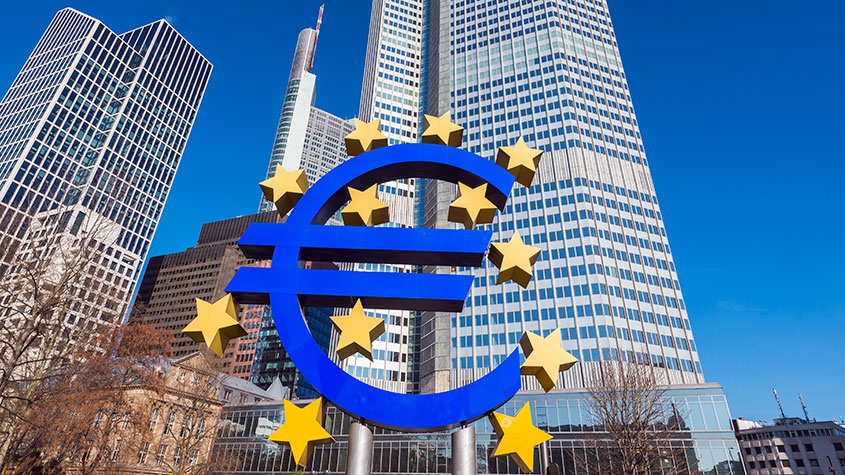Why MoneyWeek is backing Brexit
Look through the short-term economic turmoil and get inspired by a long-term vision for Britain, says John Stepek.

Get the latest financial news, insights and expert analysis from our award-winning MoneyWeek team, to help you understand what really matters when it comes to your finances.
You are now subscribed
Your newsletter sign-up was successful
Want to add more newsletters?

Twice daily
MoneyWeek
Get the latest financial news, insights and expert analysis from our award-winning MoneyWeek team, to help you understand what really matters when it comes to your finances.

Four times a week
Look After My Bills
Sign up to our free money-saving newsletter, filled with the latest news and expert advice to help you find the best tips and deals for managing your bills. Start saving today!

Look through the short-term economic turmoil and get inspired by along-term vision for Britain, says John Stepek.
23 June. That's the date that Britain will go to the polls to decide whether we should stay in the European Union or not. Prime Minister David Cameron came back from Europe last week with a deal that was more about tinkering around the edges than a radical redefinition of our relationship with Europe (see below) and which in many key areas still needs to gain the approval of the wider EU.
So it is highly unlikely to win over those already convinced of the need for "Brexit". Meanwhile, Boris Johnson Cameron's arch-rival has joined the Brexit camp, widely seen as a coup for the "leave" camp by fans of the London mayor.
MoneyWeek
Subscribe to MoneyWeek today and get your first six magazine issues absolutely FREE

Sign up to Money Morning
Don't miss the latest investment and personal finances news, market analysis, plus money-saving tips with our free twice-daily newsletter
Don't miss the latest investment and personal finances news, market analysis, plus money-saving tips with our free twice-daily newsletter
Yet those planning to vote to stay in the EU still hold sway. The gap is narrowing, but most recently a ComRes poll for the Daily Mail had "stay" on 51% versus 39% for "go" (although online polls, rather than telephone polls, apparently are much closer). If you look at the bookies who tend to get these things right more often than the pollsters then the smart money is very definitely betting on "stay". We think that's a shame.
Our view is that Britain needs to redefine its relationship with Europe, and that given Cameron's failure to do so (unsurprising, as he has no desire to leave), we should be looking to get out.
Looking at the long term
Let's be clear this isn't about the short-term economics, and nor should it be. We're currently looking in depth at the economic implications for Britain in our series of investment briefings. And at this stage, of course, depending on which assumptions you make ie, how you want to spin the figures you can make the numbers look as gloomy or as glorious as you like. But one high-profile report, commissioned from Capital Economics by UK star fund managerNeil Woodford, gives a decent overview.
There are some savings to be made from leaving (our net £9bn-odd contribution to the EU), and on trade, even in the worst-case scenario, potential trade tariffs of around 4% fall "well within the normal range of exchange-rate movements" (ie, exporters should be flexible enough to deal with extra costs on that scale). Financial services exports would be likely to take a hit, as would commercial property prices in the City of London, if fewer firms "see Britain as a gateway to Europe". But offsetting that, Britain would be freer to seek to do business elsewhere. "Non-EU countries may find negotiating with Britain easier and quicker than dealing with the EU's bureaucratic machine, as Switzerlandhas shown."
Indeed, John Kay in the Financial Times argues that trade in services Britain's forte (we're the biggest services exporter in the world, relative to GDP) has not benefited as significantly from EU membership as trade in goods ("for most services the single market remains an aspiration rather than reality"). Overall, as Woodford puts it: "I think it's really hard to see any significant credibility in an argument to stay or leave that's constructed around economics. I think it's a nil-sum game, frankly If we stay or leave the fundamentals of the economy will be relatively unmoved."
The recent slide in the pound has rattled many investors, of course my colleague Charlie Morris of the Fleet Street Letter looks in more detail at sterling's travails below but amid the panic it's worth remembering a few things. There are lots of good reasons for the pound to be falling, and not all of them are about Brexit. A few months ago, everyone expected UK interest rates to rise before too long.
Now they don't think they'll rise for at least a couple of years, particularly given Bank of England Governor Mark Carney's recent comments. Sterling is also a "risk-on" currency it strengthens when markets go up, and it weakens when they fall. 2016 has seen the worst start to a year for equities in a very long time, so we shouldn't be surprised that the pound has found the going tough too.
Why leave?
So, you might say, if the decision to stay or to leave makes little difference either way (or is even detrimental) to the economics in the short term, what's the point of taking the risk of upsetting the apple cart? Because ultimately this is about a long-term vision for Britain. We can choose to stay within the EU as it is now. On that point, it's telling that even with Britain acting from a position of relative strength, Cameron's deal which even in the most sympathetic viewing is hardly a dramatic improvement in terms is the best we can get.
Arguably, that's nothing to do with Cameron's negotiating skills, or even with intransigence on the part of the EU. It's simply what happens when you have to get 28 countries to agree on every significant change. That's why I think it makes sense to take the opportunity to regain our independence from the EU and forge our own path. Cameron suggests that this is a leap in the dark but remaining in a relationship that is so difficult to change hardly offers any certainty either.
Some people try to make the argument that the referendum is almost a moot point there won't be any EU left to worry about, given the current upheaval. That's possible. Indeed, MoneyWeek contributor Alexander Rankine outlined a road map of how Brexit could trigger the collapse of the EU itself. Yet what if the opposite happens? What if the EU bounces back stronger than ever before?
Plenty of people expected Greece to leave, spelling the beginning of the end for the euro, yet Greece is still part of the eurozone. It has proved a surprisingly durable construct so far, which is a testament to the political will behind it. That should be a warning to us non-euro members. As Andrew Lilico puts it in The Daily Telegraph, if the eurozone is to continue to work, then "the economic logic... demands that there will have to be a political union among the eurozone members".
Closer union on the part of those members by necessity will push the non-euro users like Britain to the fringe. "Within a decade, [the EU] could have morphed into a gigantic eurozone political union made up of perhaps 25 countries and four much smaller non-euro members. The eurozone political union will set the rules, and the rest of us will have to agree."
If this is the case, it means that "the UK's opportunity to shape Europe's economic policy is reaching the end of the road". Lilico argues that "the good news is that economic opportunity, both in terms of trade and influence, abounds on the outside". But if that's to be the case, then we need to make a start now.
The spectre of a happy Putin
Others argue that we shouldn't leave the EU in its hour of need. "Think of how happy it would make Putin" goes one common refrain. The trouble with this argument is that quite apart from the fact that Nato will remain intact, regardless of what happens to the EU it's important to remember that this is very likely to be a one-time only chance. It's not as though we're going to get another opportunity at a more convenient time for all involved in the future.
This referendum has come about due to a unique set of circumstances that may not be repeated for a very long time. Given the history of the Conservative party, no Tory prime minister in their right mind would have allowed this to happen unless they absolutely had to and that's precisely what happened. Cameron offered this deal in a desperate attempt to avoid mass defections to UKIP, ahead of an election he never expected to win.
And there's no reason to expect Labour to offer a referendum, even assuming it can win the 2020 election. Unlike Scotland's independence referendum, this really is likely to be a once-in-a-generation opportunity.
And regardless of the deal struck by Cameron, a vote to remain will be seen not as a vote for the status quo, but as a stamp of approval on the EU's mission. Like it or not, that logically assumes further integration. There's a whole group of people in Brussels and elsewhere in the EU whose well-paid careers and generous pensions depend directly on keeping the EU integration show on the road and giving it ever more tasks to get involved in.
Even if the EU is not directly responsible for 15%-50% of laws that end up on our statute books (that's a House of Commons estimate, demonstrating just how malleable almost every EU-related statistic is), and even if the rules that emanate from the EU are not quite as whacky as myths about cabbage regulations and exaggerations about overly bendy bananas make out, Europe gives our own bureaucrat class a very handy excuse to hide behind. The EU at the very least is an "enabler" of our own civil servants' penchant for "gold-plating" the rules. Leaving the EU would strip away that particular excuse.
Which brings us back to the core reason to vote Brexit. Ultimately, the EU is an undemocratic organisation. It epitomises "big government" aloof from and barely accountable to the population it serves. You only have to look at what happened to Greece, and past reactions to unfavourable referendum results (the response is to repeat the vote until the "right" answer comes up), for it to be clear that the people are largely viewed as a nuisance to be bulldozed aside, as and when they get in the way of the grand project. I have a problem with that, and in the end, that's why I'm voting Brexit. And I think you should too.
Dave's Big Deal: what will change?
Last week, David Cameron concluded negotiations that culminated in concessions on three major issues: immigration and benefits, relations with the eurozone, and European integration in general, writes Matthew Partridge. On immigration and benefits, the UK government will be able to apply an "emergency brake" allowing it to prevent migrants from receiving full in-work benefits until they have been in the UK for four years. This will last for seven years.
Child benefit for the non-resident children of migrants living in the UK will be adjusted in line with the cost of living in their country of residence (although this does mean that in a few circumstances child benefit sent abroad will actually rise in value). The UK will also be given extra powers to deal with sham marriages involving non-UK spouses of EU citizens.
While eastern European countries (whose citizens will bear the brunt of tighter regulations on this front) reluctantly agreed to this measure, it still has to be ratified by the EU parliament. With many MEPs still opposed to the changes, there is a chance that it will be at least partially amended. In theory the European Court of Justice could still strike down the deal as discriminatory, although it will be under intense political pressure to uphold it.
It's also worth nothing that the restrictions are tapered, not removed altogether, so those migrants who have been in the UK for more than a year will still get some benefits, gradually increasing over the four-year period.
Another area where Cameron won concessions was in tackling the fear that countries within the eurozone will either gang up to propose regulations that put the City of London at a disadvantage, or even force the UK to join the euro.
The new deal explicitly promises that Britain can keep the pound without fear that it (or other non-eurozone countries) will suffer discrimination in favour of eurozone nations, and also that it will be reimbursed for any contribution made toward eurozone bailouts. It will be able to demand that any deal between eurozone countries is reviewed to ensure it isn't discriminatory. These changes will be written into treaties (though this has still to happen, of course), making them permanent.
Finally, there are several measures that Cameron hopes will serve as a brake on further integration. The most prominent of these is agreement that the EU will explicitly exempt the UK from "ever-closer union", the term in the Treaty of Rome, which has been used by the European Commission to justify ever-further integration. Cameron is also trumpeting the ability of national parliaments collectively to agree a "red card" that would force the Commission to revise legislation to deal with their objections.
However, this concession over "ever-closer union" is mostly symbolic and will have little practical impact. While the "red card" plan is theoretically powerful, it will require support from the parliaments of nations accounting for 55% of votes. Such support will be very hard to organise within the 12-week deadline written into the red card (which also means that parliaments won't be able to challenge past legislation).
And even then it is far from an absolute veto the EU Council can press on regardless, as long as it addresses the concerns raised, notes FullFact.org.
A sterling crisis?
Last August, a surprise devaluation for the Chinese yuan triggered a market panic, and remains in part responsible for the turmoil that we've seen since,writes Charlie Morris, investment director of the Fleet Street Letter.
So it may surprise you to hear that sterling has fallen by twice as much as the yuan since then. Indeed, in terms of performance, the pound has come 70th out of 78 currencies since that time, only being pipped by the commodity-dependent Russian ruble,South African rand and Latin American currencies. Boris Johnson can take some credit for the sharp fall in sterling on Monday, as he added his political weight to the Brexit campaign.
But Johnson and, indeed, Brexit, can't take all of the credit. Much of sterling's broader weakness can be attributed to our wide current-account deficit,which has been largely caused by the faltering European economy. Weak sterling can also be attributed to the fall in markets more generally. Britain is a financial centre and sterling's health is closely linked to their success the pound tends to be a "risk-on"currency and the recent market environment has been anything but that.
On the upside, the FTSE has risen as the pound has fallen unsurprising as many FTSE 100 companies' profits come from abroad. What's notable is that gilts haven't sold off, which means the markets aren't doubting Britain's creditworthiness at least not for the time being.
When it comes to valuing the pound,purchasing power parity data from the OECD think tank puts "fair value"at around $1.42, so perhaps it is now close to its lows (speculators are certainly heavily "short" betting on further falls which is often a sign of a trend nearing exhaustion).
At current levels, it's in territory rarely seen since the Plaza Accord days of the mid-1980s. But on this front, the real question isn't so much about the pound but the dollar. And as the only major country where you can still get much of a return on your capital,the dollar bull market could well have further to go. Only the yen has managed a decent rise (10%) against the dollar since last August, followed by the Icelandic krona.
Get the latest financial news, insights and expert analysis from our award-winning MoneyWeek team, to help you understand what really matters when it comes to your finances.

-
 Average UK house price reaches £300,000 for first time, Halifax says
Average UK house price reaches £300,000 for first time, Halifax saysWhile the average house price has topped £300k, regional disparities still remain, Halifax finds.
-
 Barings Emerging Europe trust bounces back from Russia woes
Barings Emerging Europe trust bounces back from Russia woesBarings Emerging Europe trust has added the Middle East and Africa to its mandate, delivering a strong recovery, says Max King
-
 No peace dividend in Trump's Ukraine plan
No peace dividend in Trump's Ukraine planOpinion An end to fighting in Ukraine will hurt defence shares in the short term, but the boom is likely to continue given US isolationism, says Matthew Lynn
-
 Europe’s new single stock market is no panacea
Europe’s new single stock market is no panaceaOpinion It is hard to see how a single European stock exchange will fix anything. Friedrich Merz is trying his hand at a failed strategy, says Matthew Lynn
-
 Britain’s inflation problem
Britain’s inflation problemInflation in the UK appears to be remaining higher for longer when compared with similar rich countries. Why? And when can we expect a return to normal? Simon Wilson reports.
-
 Eurozone inflation hits 10.7% in October
Eurozone inflation hits 10.7% in OctoberNews Inflation across the eurozone hit 10.7% in October. What does it mean for your money?
-
 A forgotten lesson on the dangers of energy price caps
A forgotten lesson on the dangers of energy price capsAnalysis Liz Truss’s proposed energy price cap is an ambitious gamble. But a similar programme in Spain ended up being a fiasco, say Max King and Tom Murley. Here, they explain why Truss’s plan could be doomed to failure.
-
 Don't be scared by economic forecasting
Don't be scared by economic forecastingEditor's letter The Bank of England warned last week the UK will tip into recession this year. But predictions about stockmarkets, earnings or macroeconomic trends can be safely ignored, says Andrew Van Sickle.
-
 The wolf returns to the eurozone’s door
The wolf returns to the eurozone’s doorEditor's letter The eurozone’s intrinsic flaws have been exposed again as investors’ fears about Italy’s ability to pay its debt sends bond yields soaring.
-
 Eurozone economy heads for paralysis
Eurozone economy heads for paralysisNews Record high energy prices, the threat of recession in Germany and squabbling in Italy's government has left the eurozone fighting fires on all fronts.